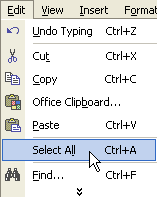Lesson 11: Selecting Text
/en/office2003basics/printing/content/
Introduction
By the end of this lesson, you should be able to:
Selecting text
When creating a file, you might want to change the way text appears.
Before you can change the font style, size, or color—or replace or delete text—you must first select, or highlight, it. There are many different selection techniques.
Remember:
- First, select the you want to change.
- Then, edit text.
- Click anywhere outside the selected area to deselect text.
First method: Click and drag to select text
- Move your pointer until the I-beam is next to the text you want to edit.
- Click the left mouse button.
- Without releasing the mouse button, drag the insertion point to select text.
- Release the left mouse button when you have selected the text you want to change.

Pros:
- Highlights letters, words, and even entire documents.
- Lots of control with individual letters, words, and phrases.
Cons:
Lack of control may cause:
- Selecting the entire file when you don't want to
- Selecting text to the right when you want to select to the left, and vice versa
Second method: Use the pointer to select the entire line of text
To select a single line of text:
- Move the I-beam to the left margin until it becomes a right-slanted white arrow pointer.
- Position the arrow pointer to the left of the line you want to highlight.
- Click once to highlight a single line.
- Click and drag up or down to select as many lines as you want to edit.

Pros:
Cons:
- Selects the entire line of text when you may not want it to
- May take some practice to position the arrow pointer correctly
Third method: Select All
Select All is helpful when you want to select the contents of an entire file.
To select an entire file:
- Choose Edit
 Select All from the menu bar (Ctrl+A).
Select All from the menu bar (Ctrl+A).

- All of the text in your file will be selected instantly.

Pros:
- Great when you need to quickly select all text in a file (ideal for changing font style or size)
Cons:
- Selects all text when you may not need it
Fourth method: Use the keyboard
Many people use the keyboard to select text.
| Shift+right arrow | Character to the right of the insertion point |
| Shift+left arrow | Character to the left of the insertion point |
| Shift+Home | All of the current line to the left of insertion point |
| Shift+End | All of the current line to the right of insertion point |
| Shift+PageUp | A screenful of text from insertion point up |
| Shift+PageDown | A screenful of text from insertion point down |
| Ctrl+Shift+Right Arrow | One word to the right of insertion point |
| Ctrl+Shift+Left Arrow | One word to the left of insertion point |
| Crtl+Shift+Home | All text from insertion point to the beginning of document |
| Crtl+Shift+End | All text from insertion point to the end of document |
| Alt+Ctrl+Shift+PageDown | All text from insertion point to end of the displayed window |
| F8 and arrow key | From insertion point in the direction of whichever arrow chosen |
| F8 turns on selection mode | Press Esc to leave selection mode |
| Crtl+A | Selects entire file |
Troubleshooting selection techniques
When using the click-and-drag method to select text, have you ever selected a lot of text without meaning to?
What can you do to avoid this frustration? Use the Shift key.
- Click once at the starting point of the text you desire to be selected.
- Hold down the Shift key on the keyboard while clicking at the ending point of the text you desire to be selected.
- The text in between those two points should be selected.
 When text is selected, pressing any key will delete it. The Undo button often comes in handy for this common mistake.
When text is selected, pressing any key will delete it. The Undo button often comes in handy for this common mistake.
Challenge!
- Open Word 2003.
- Open an existing file.
- Practice selecting text using each of the methods described in this lesson:
- Click and drag to select text.
- Use the pointer to select the entire line of text.
- Try Select All.
- Use the keyboard.
- Close the file and exit Word 2003.
/en/office2003basics/using-undo-and-redo/content/




 Select All from the menu bar (Ctrl+A).
Select All from the menu bar (Ctrl+A). 

 When text is selected, pressing any key will delete it. The Undo button often comes in handy for this common mistake.
When text is selected, pressing any key will delete it. The Undo button often comes in handy for this common mistake.